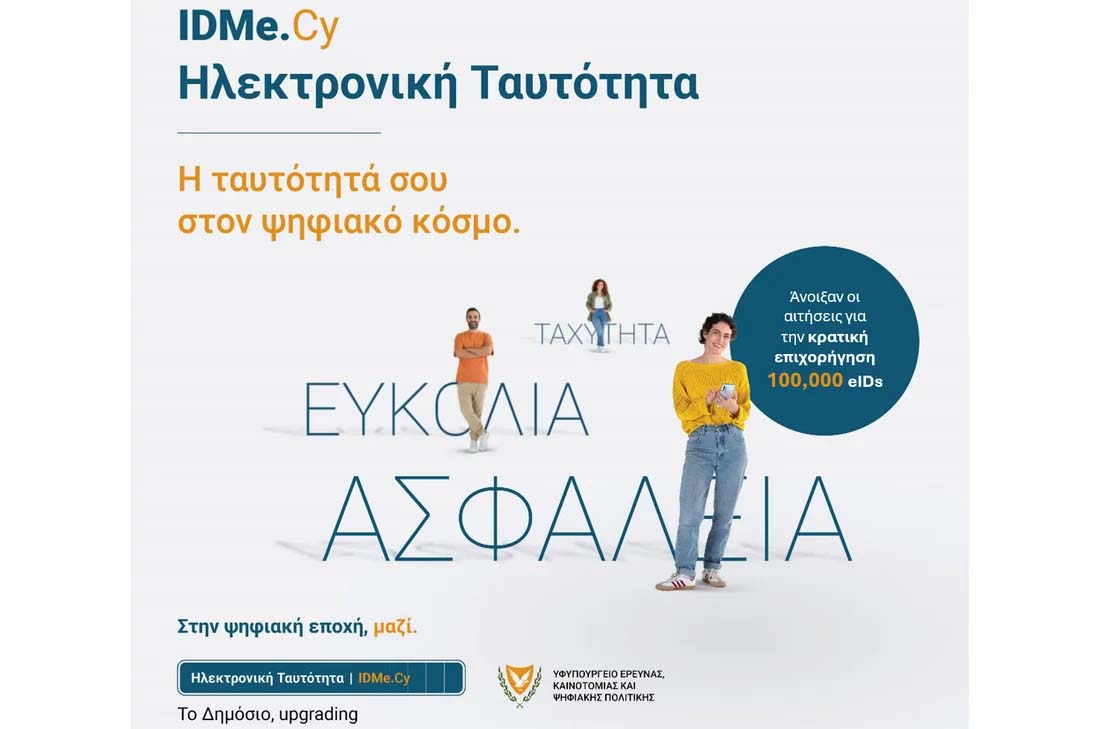The launch of the newly introduced electronic identity (eID) at the end of January was expected to be a significant leap forward in digital access. However, take-up has been sluggish, with only 8,200 applications submitted until this week – far below anticipated numbers.
To help spur adoption, the first 30,000 eIDs are being offered free of charge, with another 70,000 available for €15. Afterwards, the price will rise to €50. This pricing structure was designed as an incentive to encourage citizens to embrace use of the eID and ease its rollout, but early indications suggest the journey ahead may be more challenging than expected.
Out of the 8,200 applications, 4,500 were submitted within the first two days following the eID launch. However, since then, the number of applications has increased only slowly. As of now, only 2,100 eIDs have been issued.
In Cyprus, eID issuance is managed by the private company JCC Payment Systems, a well-known provider of payment services.
“What we see in the EU is that adaptation is directly in correlation with the number of use-cases offered,” Maria Kalli, digital trust services manager at JCC Payment Systems told the Cyprus Mail. By this, she is referring to expanding the range of services that accept eIDs, which currently are primarily available through governmental services.
For now, utilisation of eIDs is primarily focused on specific governmental services and, according to Kalli, many public officers have applied for the acquisition of their eIDs.
Kalli said that eID has gained significant popularity among users of the “Ippodamos” electronic portal, such as architects, as it allows them to upload building permits and other documents and sign them digitally using their eID.
This means that rental agreements or mostly any other kind of contracts can be signed only if all the parties can sign the document digitally, Kalli says.
Who applies for eIDs?
The deputy research ministry reports that the majority of appointments have been booked at the Citizen Service Centres (KEP) in Nicosia, with younger age groups leading the way.
Fifty-five per cent of applicants are between 35 and 54 years old, followed by another 35 per cent between 18 and 34. In contrast, the numbers among older age groups are significantly lower with only eight per cent aged between 55 and 74 and just two per cent over 75.
The data highlights a clear digital divide, with younger people more likely to engage with online services. This also raises questions about whether rural areas are fully embracing this shift, or if limited access to digital services is still a barrier in villages. The trend also highlights the need for targeted outreach and support for older individuals, particularly in rural regions, as they may face challenges navigating new technologies.
What’s the use of eIDs?
Electronic IDs can be used to electronically sign documents and access governmental services online. “The Cyprus eID consists of two certificates, one that can be used for online authentication and one to digitally sign documents,” Kalli explained.
The “double certificate” of the service refers to two key functionalities. Once citizens sign up, they can securely access online services, such as Cylogin or Ippodamos, using their eID – this serves as the authentication part of the service. In addition, they can digitally sign documents through the signature feature included, which constitutes the authorisation aspect. This dual functionality aims to provide both secure access and verification in one integrated service.
EIDs versus Digital Citizen
It is important to distinguish between electronic IDs and the “digital citizen” application that was launched in December 2024. The deputy research ministry highlights that the eID is a “completely different tool from the Digital Citizen” app. While the app allowed for issuing and saving documents in a digital form to interact in the physical world, the eID served as the respective citizens’ proof of identity in the digital world.
It primarily acts as a digital storage space for physical identification documents, such as passports, driver’s licences and ID cards, allowing users to access them digitally. It also provides a digital version of the transport ministry certificates, streamlining processes for citizens. The digital documents of the app are fully equivalent to physical documents and can be used for legal purposes within Cyprus.
EIDs, on the other hand, are a service offering a set of functionalities beyond simple identification, enabling citizens to securely access online services and digitally sign documents with the same legal weight as a handwritten signature. It supports a range of digital interactions and reduces the need for in-person verification.
Can private eID issuance be secure?
The management of electronic identification systems varies among the EU member states. Some countries, like Germany, have adopted a model where the state plays a significant role in providing eID services. The German eID system is integrated into the national identity card, which is issued and managed by the government. This approach ensures that the state maintains control over the eID infrastructure, aiming to provide secure and reliable digital identification for its citizens.
In Cyprus, the private company JCC, of which Deputy Research Minister Nikodemos Damianou was previously the general manager, is responsible for issuing the e-IDs, with data stored in a data centre in Nicosia. According to JCC, the company undergoes an annual audit to ensure its compliance as a qualified trust service and eID provider in line with the related legislations, regulations and governmental decrees.
These audits, JCC says, are conducted by an external audit firm.
JCC says it was appointed to provide 100,000 subsidised eIDs following an open tender by the government.
“The framework for becoming an authorised eID provider in Cyprus is open to all organisations who meet the requirements set by the eID National Scheme,” the deputy research ministry told the Cyprus Mail. JCC is currently the only qualified eID provider in the Republic.
The ministry adds that the Cypriot eID scheme was approved by the EU and said the issuing of eIDs followed “strict security standards mandated by legislation”.
Yet the concentration of such a crucial and data-sensitive service in the hands of a private entity raises concerns about the monopoly JCC holds over this essential function. This connection raises questions about the long-term sustainability of the arrangement and its potential implications for transparency, competition and public access to digital services.

All EU member states must implement electronic IDs by 2026
In Cyprus, eligibility is limited exclusively to Cypriot citizens with biometric identity documents, that contain information like fingerprints, DNA or iris recognition
Technically every country is responsible to provide its citizens with an electronic identity system themselves, however other EU countries like Austria, applications are open to both country-nationals and residents as long as a form of biometric identity documents can be provided. Internationals living in Cyprus can therefore not access the service.
As per the EU Digital Identity Framework Regulation that came into force in 2024, all member states are required to offer “at least one EU Digital Identity Wallet to all Citizens, and Residents by 2026”. Its use, however, will remain a free choice.
How to sign up
First, citizens need to apply the official online portal (currently only available in Greek), and in a second step schedule an appointment at the Citizen Service Centre (KEP) or directly at JCC where their application will be verified. For the KEP appointment citizens need to take a biometric physical ID and the printed application form. Then, another authorised officer will review the application and check if all the entered information is correct and valid.
Once the application is approved, citizens receive an SMS and an e-mail allowing them complete the application by setting their account with a password.
The whole process, from online application to the final notification of approval, takes an estimated three to five days according to JCC. However, depending on availability of appointments at the citizen centers, delays might occur.
Detailed instructions for obtaining and using the eID can be found on www.idme.gov.cy. Or contact +357 22 868500 (available 24/7).
Key take-aways:
- eIDs can be used for online authorisation and signing
- eIDs are valid for three years
- The first 30,000 eIDs are free
- Another 70,000 eIDs are made available at a reduced price of € 15
- eIDs will not become mandatory anytime soon
- eIDs currently only replace physical signatures for specific services see www.idme.cy






Click here to change your cookie preferences